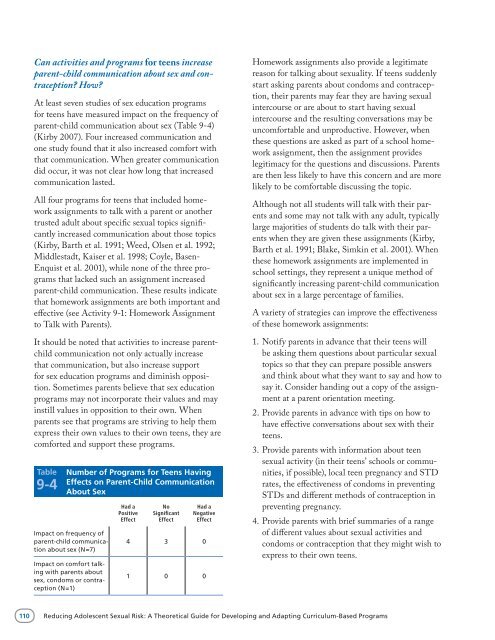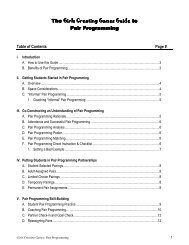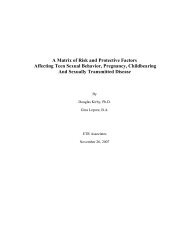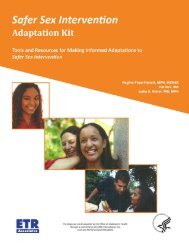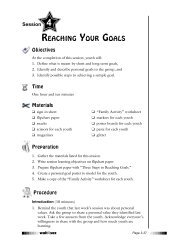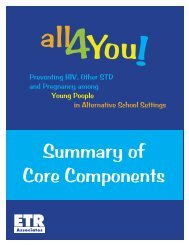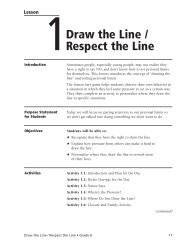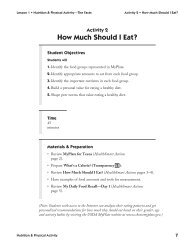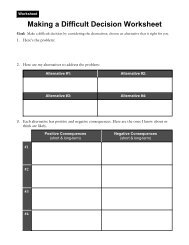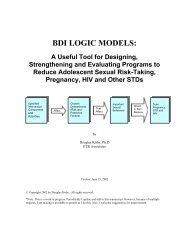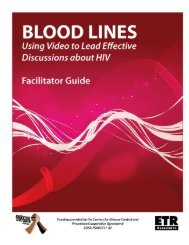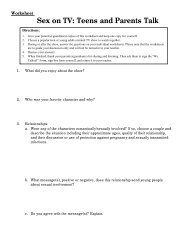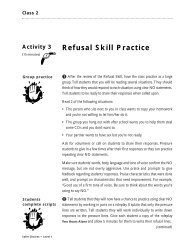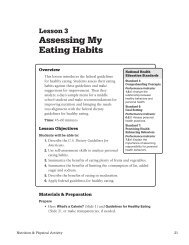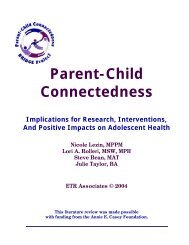Reducing Adolescent Sexual Risk: A Theoretical - ETR Associates
Reducing Adolescent Sexual Risk: A Theoretical - ETR Associates
Reducing Adolescent Sexual Risk: A Theoretical - ETR Associates
- No tags were found...
Create successful ePaper yourself
Turn your PDF publications into a flip-book with our unique Google optimized e-Paper software.
Can activities and programs for teens increaseparent-child communication about sex and contraception?How?At least seven studies of sex education programsfor teens have measured impact on the frequency ofparent-child communication about sex (Table 9-4)(Kirby 2007). Four increased communication andone study found that it also increased comfort withthat communication. When greater communicationdid occur, it was not clear how long that increasedcommunication lasted.All four programs for teens that included homeworkassignments to talk with a parent or anothertrusted adult about specific sexual topics significantlyincreased communication about those topics(Kirby, Barth et al. 1991; Weed, Olsen et al. 1992;Middlestadt, Kaiser et al. 1998; Coyle, Basen-Enquist et al. 2001), while none of the three programsthat lacked such an assignment increasedparent-child communication. These results indicatethat homework assignments are both important andeffective (see Activity 9-1: Homework Assignmentto Talk with Parents).It should be noted that activities to increase parentchildcommunication not only actually increasethat communication, but also increase supportfor sex education programs and diminish opposition.Sometimes parents believe that sex educationprograms may not incorporate their values and mayinstill values in opposition to their own. Whenparents see that programs are striving to help themexpress their own values to their own teens, they arecomforted and support these programs.Table9-4Number of Programs for Teens HavingEffects on Parent-Child CommunicationAbout SexImpact on frequency ofparent-child communicationabout sex (N=7)Impact on comfort talkingwith parents aboutsex, condoms or contraception(N=1)Had aPositiveEffectNoSignificantEffectHad aNegativeEffect4 3 01 0 0Homework assignments also provide a legitimatereason for talking about sexuality. If teens suddenlystart asking parents about condoms and contraception,their parents may fear they are having sexualintercourse or are about to start having sexualintercourse and the resulting conversations may beuncomfortable and unproductive. However, whenthese questions are asked as part of a school homeworkassignment, then the assignment provideslegitimacy for the questions and discussions. Parentsare then less likely to have this concern and are morelikely to be comfortable discussing the topic.Although not all students will talk with their parentsand some may not talk with any adult, typicallylarge majorities of students do talk with their parentswhen they are given these assignments (Kirby,Barth et al. 1991; Blake, Simkin et al. 2001). Whenthese homework assignments are implemented inschool settings, they represent a unique method ofsignificantly increasing parent-child communicationabout sex in a large percentage of families.A variety of strategies can improve the effectivenessof these homework assignments:1. Notify parents in advance that their teens willbe asking them questions about particular sexualtopics so that they can prepare possible answersand think about what they want to say and how tosay it. Consider handing out a copy of the assignmentat a parent orientation meeting.2. Provide parents in advance with tips on how tohave effective conversations about sex with theirteens.3. Provide parents with information about teensexual activity (in their teens’ schools or communities,if possible), local teen pregnancy and STDrates, the effectiveness of condoms in preventingSTDs and different methods of contraception inpreventing pregnancy.4. Provide parents with brief summaries of a rangeof different values about sexual activities andcondoms or contraception that they might wish toexpress to their own teens.110 <strong>Reducing</strong> <strong>Adolescent</strong> <strong>Sexual</strong> <strong>Risk</strong>: A <strong>Theoretical</strong> Guide for Developing and Adapting Curriculum-Based Programs


